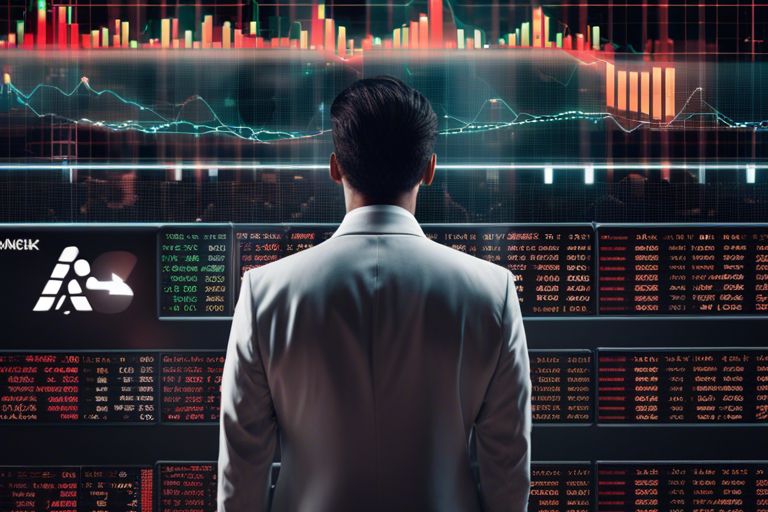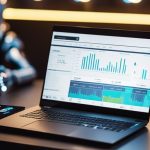Just when you thought you had a grasp on stock market dynamics, artificial intelligence introduces a layer of complexity that reshapes traditional investing paradigms. As AI continues to evolve and influence trading strategies, it poses both opportunities and risks that could unexpectedly amplify market volatility. You may find it crucial to understand how these advanced algorithms could impact not only your investment decisions but also the broader economic landscape. This post will explore the unforeseen effects AI may have on stock market fluctuations and provide insights to navigate this emerging frontier.
Key Takeaways:
- Algorithmic Trading: The rise of AI-driven algorithmic trading can lead to increased market volatility as these systems react faster than human traders to news and market changes.
- Market Sentiment Analysis: AI can enhance the ability to analyze market sentiment from social media and news outlets, potentially leading to sudden shifts in stock prices as sentiment data is integrated into trading strategies.
- Flash Crashes: The interconnectedness of AI systems may contribute to flash crashes, where rapid sell-offs occur due to cascaded algorithms responding to declining prices simultaneously.
- Regulatory Challenges: The use of AI introduces new regulatory challenges as governments may struggle to keep up with the speed and complexity of AI-driven trading practices.
- Human Behavioral Factors: AI technologies may overlook human emotions and irrational behaviors that traditionally influence market dynamics, which could lead to unpredictable volatility periods.
Understanding AI in Finance
Before delving into the specific impacts of AI on stock market volatility, it’s necessary to grasp the foundational concepts of artificial intelligence in finance. AI encompasses a range of technologies that leverage vast amounts of data to analyze trends, predict outcomes, and enhance decision-making processes. In the world of finance, AI can transform the way traders and investors approach the stock market by providing insights that were previously unattainable through traditional methods.
Overview of AI Technologies
The use of AI technologies in finance includes machine learning, natural language processing, and predictive analytics, among others. Machine learning algorithms enable systems to learn from data patterns and improve over time without explicit programming. Natural language processing helps analyze news articles, financial reports, and social media to gauge market sentiment. Predictive analytics utilizes historical data to forecast future price movements, making your investment strategy more data-driven.
Current Applications in Stock Trading
An increasing number of financial institutions and hedge funds are incorporating AI into their stock trading strategies. Algorithms can now execute trades within milliseconds based on real-time data, offering a significant edge in speed and accuracy. As a result, traders can respond to market fluctuations more swiftly, potentially reducing the risk associated with volatility. Additionally, AI can assist in portfolio management, helping you identify optimal asset allocations based on historical performance and market conditions.
Overview of AI in stock trading reveals a landscape where predictive models and algorithmic trading are becoming the norm. These technologies enable firms to backtest their strategies against extensive datasets, refining their approaches before executing on the market. Furthermore, AI algorithms can adapt to changing market conditions, which helps you navigate your investment decisions more effectively. As you adopt AI tools, it’s crucial to understand their capabilities and limitations, as this will allow you to integrate them thoughtfully into your trading strategies.
The Interaction Between AI and Market Volatility
Some of the most significant interactions between artificial intelligence and market volatility arise from the use of advanced predictive algorithms and automated trading systems. These technologies have the potential to reshape how investors approach market fluctuations, often in ways that you may not initially expect. While AI can help you predict market trends and optimize trading strategies, its influence on market behavior can lead to increased volatility due to the speed and scale at which transactions occur.
Predictive Algorithms and Market Fluctuations
One of the primary ways AI impacts market volatility is through predictive algorithms, which analyze vast amounts of financial data to forecast stock price movements. These algorithms use historical data, market sentiment, and other variables to generate buy and sell signals, allowing you to make more informed investment decisions. However, the reliance on these algorithms can lead to herding behavior among traders, where many investors follow the same signals simultaneously, resulting in rapid price swings and increased volatility.
Automated Trading and Its Effects
To understand the effects of automated trading, consider how these systems make high-frequency trades based on real-time data. When you use automated trading, you engage in a competitive landscape where algorithms execute trades faster than human capabilities, often reacting to market changes within milliseconds. This speed can lead to a significant increase in trading volume and may introduce unexpected price movements, impacting your trading strategy and overall market stability.
It’s important to note that while automated trading can bring efficiency to the market, it can also amplify volatility during periods of uncertainty. For instance, if multiple automated systems react to the same market signal, it can trigger a chain reaction of buying or selling, further exacerbating price fluctuations. As an investor, you need to be aware of how these dynamics might affect your portfolio and adapt your strategies accordingly.
Human-AI Collaboration in Stock Trading
Volatility can also be influenced by the collaboration between human traders and AI technologies. By leveraging AI’s predictive capabilities, you can enhance your decision-making process while retaining the intuitive aspects of human judgment. This partnership can help you navigate market complexities more effectively, as AI complements your existing knowledge and experience. However, it is crucial to strike a balance between reliance on AI and maintaining your analytical skills, as the market can present unpredictable challenges.
Algorithms that support human decision-making can strengthen your trading approach, but it’s necessary to remain cautious. Emphasizing the importance of human oversight allows you to question and validate AI-generated insights, ensuring that your strategies remain aligned with your investment objectives and risk tolerance. Ultimately, a synergistic relationship between you and AI may lead to more resilient trading practices in the face of market volatility.
Potential Unforeseen Impacts
Many investors and analysts are concerned that the introduction of AI in the stock market could lead to unforeseen impacts that may significantly alter market dynamics. Understanding these potential consequences is crucial for both individuals and institutions involved in trading. As AI algorithms become more sophisticated, they might introduce new ways of analyzing data and executing trades, which could lead to effects that are difficult to predict but crucial to grasp for informed decision-making.
Emergence of New Trading Patterns
With the rise of AI technologies, you may begin to notice the emergence of new trading patterns that deviate from traditional strategies. AI systems are capable of identifying and exploiting inefficiencies in the market faster than any human can, potentially leading to the formation of a new set of trading behaviors in response to this advanced technology. This rapid evolution could create a dynamic where certain stocks or sectors become more vulnerable to volatility, thereby complicating your investment strategies.
Moreover, the development of machine learning techniques that continuously adapt to market changes may exacerbate price movements, leading to rapid shifts in asset valuations. As you become more familiar with these new patterns, it will be important to remain vigilant and continually reassess your trading strategies to avoid being caught in sudden market corrections driven by AI-initiated trades.
Risks of Over-optimization
Trading based on AI algorithms often leads to the risk of over-optimization, where systems are finely tuned to past market conditions but fail to perform well in the unpredictable nature of real-world scenarios. You may find that these algorithms, while seemingly robust, make decisions based on historical data that do not account for unprecedented market events. Therefore, relying too heavily on overly optimized models could lead to significant losses during turbulent times.
A key hazard in this context is the phenomenon known as “model risk,” where traders place undue confidence in a system that does not perform as expected under new market conditions. You’ll need to ensure that any system you choose to rely upon incorporates measures to account for evolving market dynamics to mitigate the risks associated with over-optimization.
Behavioral Economics and AI Influence
On a broader scale, the introduction of AI into stock trading poses unique challenges related to behavioral economics. Your investment choices may be influenced not only by algorithms but also by how market participants react to those algorithms’ outputs. When many investors adjust their strategies in response to AI-generated signals, this could lead to herd behavior, potentially amplifying market volatility.
Potentially, the interplay between AI-driven trading strategies and human emotional responses may create feedback loops that exacerbate market swings. You should remain aware of the psychological aspects that influence both human and AI decision-making, as they can interact in complex ways that affect market stability and your investment outcomes.
Market Manipulation Risks
Unforeseen implications also arise from the potential for market manipulation using advanced AI technologies. With the ability to process vast amounts of data and execute trades at lightning speeds, you could witness a new form of market manipulation where malicious actors leverage these technologies to affect stock prices artificially. This could result in heightened market volatility and risks for investors who are caught off guard by sudden, orchestrated price movements.
Influence from these manipulative practices may lead to a market environment where trust is significantly undermined. As an investor, you must remain vigilant and employ diverse strategies to protect your portfolio and respond to unusual market behavior that could be a result of AI-driven manipulations. Resilience to these unforeseen impacts will ultimately depend on your capacity to adapt and understand the broader ramifications of AI within financial markets.
Summing up
Drawing together the various threads of how AI technology integrates into financial markets, you must consider the potential unforeseen impacts on stock market volatility. While AI enhances trading efficiency and speeds up data processing, it also introduces complexities that could unpredictably influence market dynamics. For instance, AI algorithms operate based on existing data, which means that unanticipated events—like geopolitical crises or sudden changes in economic indicators—could lead to extreme fluctuations if algorithms react too quickly or too aggressively. You should remain aware of the pressures this technology places on market psychology, as a sudden shift caused by algorithmic trading can trigger cascading effects across the board.
Your understanding of AI’s role in stock market volatility should also encompass the ethical implications and the potential for systemic risks. As AI systems become more integrated into trading practices, the reliance on these technologies can create a lack of transparency in market movements. If left unchecked, this could lead to scenarios where human oversight is diminished, and decisions are driven by algorithmic responses rather than fundamental analyses. As a savvy investor, you should stay informed about these developments to better navigate the increasingly complex landscape of AI and finance, ensuring that your investment strategies remain resilient in the face of rapid technological changes.




